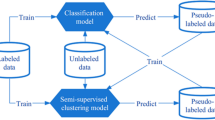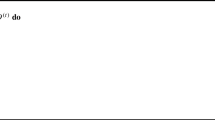Abstract
Uncoupled regression is the problem of learning a regression model from uncoupled data that consists of a set of input values (unlabeled data) and a set of output values where the correspondence between the input and output is unknown. A recent study showed that a method using both uncoupled data and pairwise comparison data can learn the optimal model under some assumptions. However, this method cannot use grouped information and may require the implementation (almost) from scratch for some models. In this study, we extend the above existing method for handling group information and derive a general algorithm that can learn a model using the standard regression method by approximating the loss function. The effectiveness of the proposed method is confirmed by synthetic and benchmark data experiments.
Access this chapter
Tax calculation will be finalised at checkout
Purchases are for personal use only
Similar content being viewed by others
References
Carpentier, A., Schlüter, T.: Learning relationships between data obtained independently. In: Artificial Intelligence and Statistics, pp. 658–666 (2016)
Hsu, D., Shi, K., Sun, X.: Linear regression without correspondence. In: Proceedings of the 31st International Conference on Neural Information Processing Systems, pp. 1530–1539 (2017)
Abid, A., Poon, A., Zou, J.: Linear regression with shuffled labels. arXiv preprint arXiv:1705.01342 (2017)
Xu, L., Niu, G., Honda, J., Sugiyama, M.: Uncoupled regression from pairwise comparison data. In: Advances in Neural Information Processing Systems, pp. 3992–4002 (2019)
Goodfellow, I., Bengio, Y., Courville, A.: Deep learning. MIT Press Cambridge (2016)
Williams, C.K., Rasmussen, C.E.: Gaussian processes for machine learning, vol. 2. MIT press Cambridge, MA (2006)
Breiman, L.: Random forests. Mach. Learn. 45(1), 5–32 (2001)
Friedman, J.H.: Greedy function approximation: a gradient boosting machine. Ann. Statist. 29(5), 1189–1232 (2001)
Titsias, M.: Variational learning of inducing variables in sparse Gaussian processes. In: Artificial intelligence and statistics, pp. 567–574. PMLR (2009)
Ke, G., et al.: LightGBM: a highly efficient gradient boosting decision tree. Adv. Neural. Inf. Process. Syst. 30, 3146–3154 (2017)
Pananjady, A., Wainwright, M.J., Courtade, T.A.: Linear regression with shuffled data: statistical and computational limits of permutation recovery. IEEE Trans. Inf. Theory 64(5), 3286–3300 (2017)
Slawski, M., Rahmani, M., Li, P.: A sparse representation-based approach to linear regression with partially shuffled labels. In: Proceedings of The 35th Uncertainty in Artificial Intelligence Conference, pp. 38–48 (2020)
Unnikrishnan, J., Haghighatshoar, S., Vetterli, M.: Unlabeled sensing with random linear measurements. IEEE Trans. Inf. Theory 64(5), 3237–3253 (2018)
Bregman, L.M.: The relaxation method of finding the common point of convex sets and its application to the solution of problems in convex programming. USSR Comput. Math. Math. Phys. 7(3), 200–217 (1967)
Banerjee, A., Merugu, S., Dhillon, I.S., Ghosh, J., Lafferty, J.: Clustering with Bregman divergences. J. Mach. Learn. Res. 6(10), 1705–1749 (2005)
Author information
Authors and Affiliations
Corresponding author
Editor information
Editors and Affiliations
Rights and permissions
Copyright information
© 2023 The Author(s), under exclusive license to Springer Nature Switzerland AG
About this paper
Cite this paper
Kohjima, M., Nambu, Y., Kurauchi, Y., Yamamoto, R. (2023). General Algorithm for Learning from Grouped Uncoupled Data and Pairwise Comparison Data. In: Tanveer, M., Agarwal, S., Ozawa, S., Ekbal, A., Jatowt, A. (eds) Neural Information Processing. ICONIP 2022. Lecture Notes in Computer Science, vol 13623. Springer, Cham. https://doi.org/10.1007/978-3-031-30105-6_13
Download citation
DOI: https://doi.org/10.1007/978-3-031-30105-6_13
Published:
Publisher Name: Springer, Cham
Print ISBN: 978-3-031-30104-9
Online ISBN: 978-3-031-30105-6
eBook Packages: Computer ScienceComputer Science (R0)




